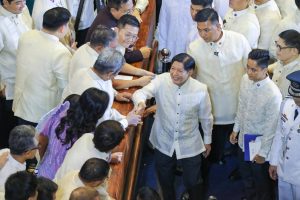Philippine President Ferdinand Marcos Jr. has used his annual State of the Union speech to emphasize his administration’s resolve to defend the country’s territorial integrity, following a year of growing frictions in disputed waters.
Couched between claims about his administration’s strong economic record and an announcement of an amnesty for armed insurgents, Marcos vowed that the country’s territory would remain “inviolable.”
As so often in these instances, the Philippine leader’s speech did not explicitly mention China, but the context made it abundantly clear that the Philippine leader was referring to the tensions in the South China Sea, which have intensified considerably over the past two years.
“Our journey to progress requires not only unity and social cohesion amongst our people. It is also imperative that our nation remains intact and inviolable,” Marcos said, according to The Associated Press, to applause from lawmakers and government officials in the House of Representatives.
“We will protect our sovereign rights and preserve our territorial integrity, in defense of rules-based international order,” he added. “With our national interest paramount, we will always pursue constant dialogue and diplomatic approaches to the resolution of any issue that may arise.”
Marcos noted that the Philippines would stick with the policy of being “a friend to all and enemy to none,” a strategy that he said has proven effective.
The speech caps off a year in which the Marcos administration has stiffened its stance against Chinese incursions, in the South China Sea, where Beijing’s maximalist “nine-dash line” claim intersects with a large part of the Philippines’ 200-nautical-mile Exclusive Economic Zone. Last year, bridging the Duterte and Marcos administrations, Manila filed nearly 200 diplomatic protests against Chinese actions.
As part of this effort, Manila has fortified its treaty alliance with the United States, which had stagnated under his erratic predecessor Rodrigo Duterte. In February, Marcos approved the U.S. military’s access to four additional bases under the 2014 Enhanced Defense Cooperation Agreement (EDCA), bringing the total number to nine. (Two are located on the island of Palawan, close to the disputed Spratly Islands.) EDCA allows the U.S. military to rotate troops through select Philippine military bases, and to use facilities such as runways and fuel storage depots.
The Marcos administration has also gone to much greater lengths to publicize Beijing’s aggressive deployments of coast guard and maritime militia vessels into Philippine-claimed waters, and has ramped up its patrols, sorties, and overflights of disputed areas. For instance, in February, the Philippine Coast Guard announced that a Chinese coast guard ship had allegedly aimed a military-grade laser at a Philippine patrol vessel close to Second Thomas Shoal, a submerged reef inside the country’s EEZ. The laser temporarily blinded some of the crew aboard the vessel and prevented it from approaching the shoal to resupply the marine unit stationed there.
Last month, the Philippines also hosted the first trilateral exercise with the coast guards of Japan and the United States.
At the same time, Marcos has made efforts not to alienate China, with which the Philippines enjoys mutually beneficial economic relations. His reference to “dialogue and diplomatic approaches” was therefore clearly intended to telegraph that the improved security relations with the U.S. are aimed not at China but intended to support the defense of Philippine claims – disputes that can in principle be resolved through dialogue.
However, given that China has so far shown little interest in reaching a final negotiated settlement with rival claimants, let alone on the basis of international law, the Philippines will continue to face a delicate balance in strengthening its security ties with Washington while maintaining a stable economic relationship with China.

































